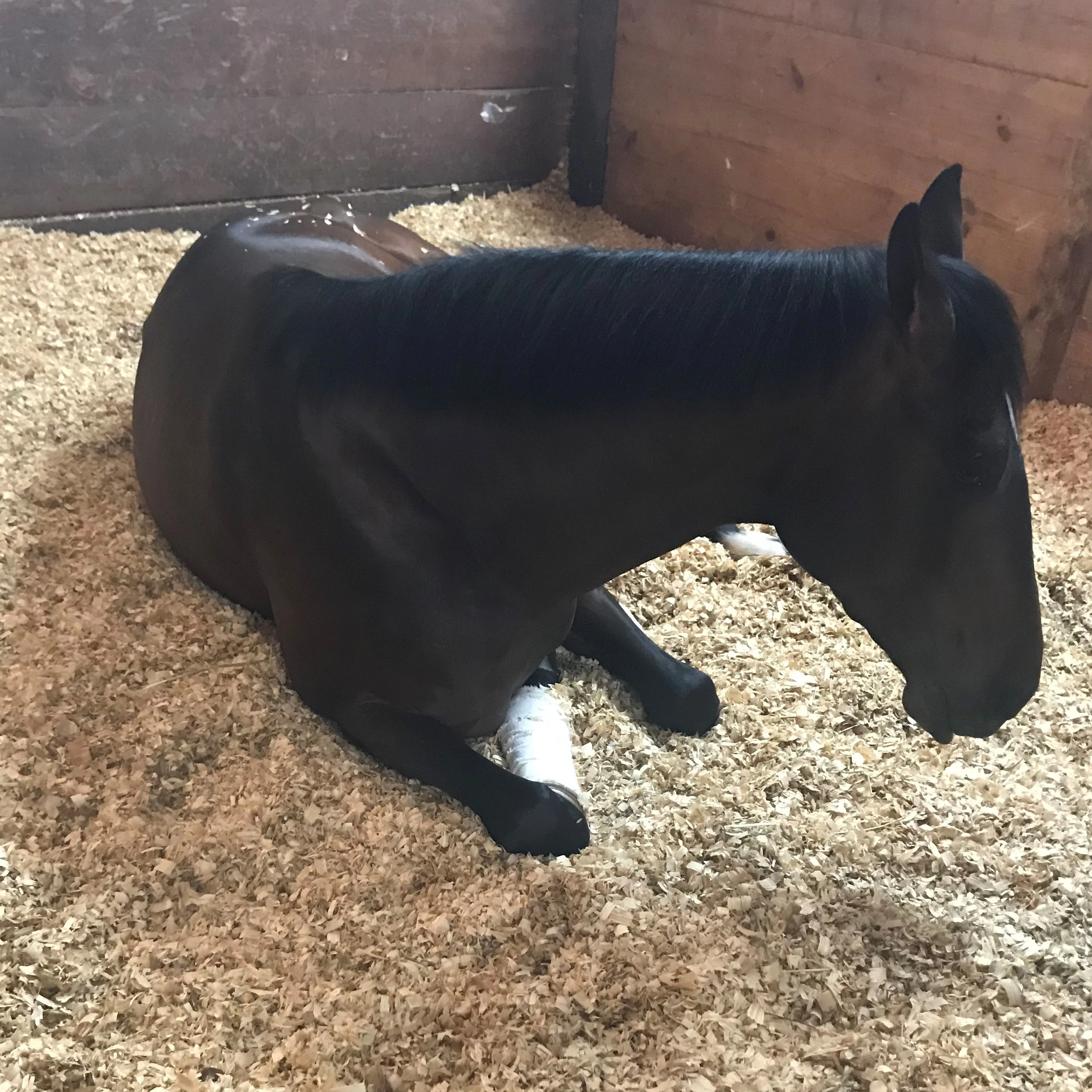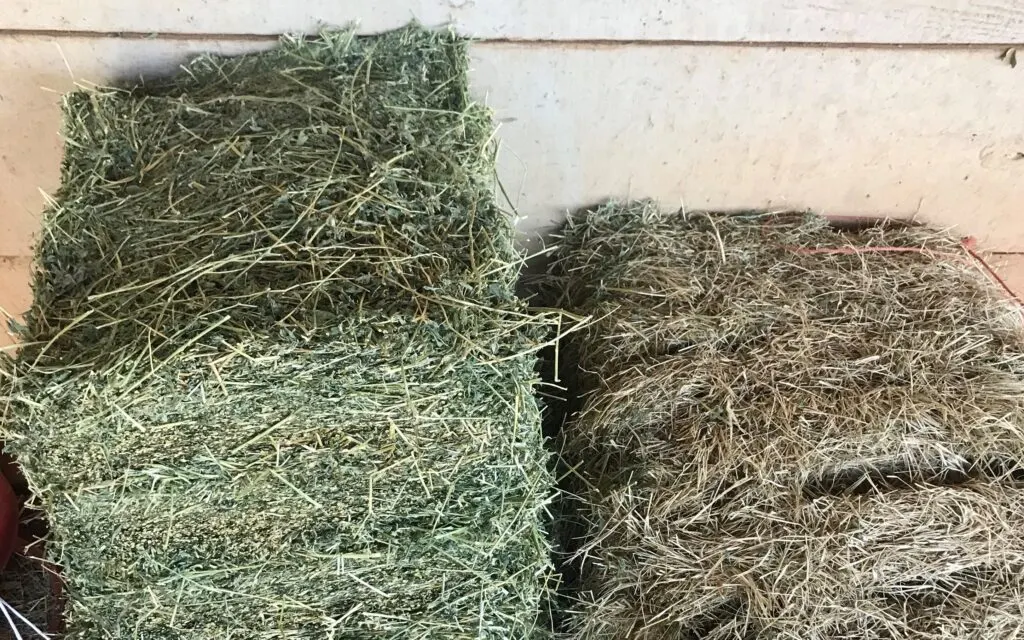Last updated: June 17, 2022
I avoid feeding hay in bulk because I fear it will mold and my horses won’t eat it, or if they do eat it, they’ll get sick. But some horse owners disagree with me and put round hay bales in their pastures. I decided to find out if horses will eat moldy hay and whether it safe for them.
Horses will eat moldy hay, especially if they have no alternative forage, but consuming moldy hay is dangerous and can cause digestive and respiratory diseases. Moldy hay can be fatal for horses; however, eating a small amount shouldn’t cause serious problems.
Many horse owners believe it’s ok to provide bulk hay to their animals. However, when hay is left out too long, it develops mold, and horses will eat the mold-laden forage, which creates health problems.
This article is one in a series on horse hay I wrote, the main article being: Horse Hay: An Owner’s Guide.

What happens if a horse eats moldy hay?
Mold grows on hay during the hay-making process, in storage, or left too long in humid conditions. Without proper oversight, your horse may eat moldy hay, and if this happens, how does it affect your horse?
Horses that eat moldy hay can die or show no ill effects at all. It entirely depends on the amount of mold your horse ingest, the type of mold, and your horse’s condition.
Hay with mold is dangerous for horses to eat; it can be toxic, and cause colic and respiratory diseases like heaves. Many types of molds can grow in the hay, and each causes different reactions.
Types of mold found in hay.
The seven common types of molds typically found in hay are Alternaria, Aspergillus, Cladosporium, fusarium, mucor, penicillium, and rhizopus. Each of these molds produces airborne particles that cause respiratory diseases.
In some cases, the mold can produce mycotoxins, which are naturally occurring poisons. The health effects of ingesting mycotoxins can range from acute poisoning to immune deficiency and even cancer.

Can moldy hay kill a horse?
Some people claim they feed moldy hay to their horses and cows without ever having an issue. If this is true, they’ve been fortunate and are taking a big chance.
Moldy hay can kill a horse. It’s a cause of colic that can be fatal, and some types of mold are toxic to horses. And inhaled mold spores enter horses’ respiratory systems when they eat, causing heaves or other chronic respiratory diseases.
Feeding moldy hay to horses is dangerous. If it doesn’t kill them, it is likely to cause them to get sick, and for pregnant mares, the risks are even more significant.
The toxins from moldy hay can cause a pregnant mare to abort her foal, and she is at risk for the same diseases as other horses. However, some horses may exhibit minor symptoms but feeding nasty hay to horses is not worth the risk to your animal’s health.
What to do if your horse eats moldy hay.
We had some moldy hay fed to our horses accidentally by a young friend. He accompanied my grandson to the barn and pulled a couple of hay flakes from bales we separated because they had mold.
If your horse ate moldy hay, you should contact a vet right away. He may try to remove the hay with a tube or administer a laxative so the toxin will pass before it is absorbed. If the horse ate a small amount of moldy hay, he might advise you to give the horse mineral oil and watch for symptoms.
It is critical to attack the problem quickly. If too much time passes and your horse consumed a lot of moldy hay, it is more difficult to treat successfully and can cause long-term health issues.
Symptoms caused by eating moldy hay.
It’s challenging to look at a horse and relate its condition to mold poisoning because many things cause similar symptoms. Colic, for example, can also be caused by overeating, changing feeds, and dehydration.
The most common symptoms to watch for if your suspect your horse ate moldy hay are stomach discomfort, rolling on the ground, drooling, diarrhea, trembles, and difficulty breathing.
If your display some of these signs, check your hay for mold. It may not be the cause, but it is a good starting point. It’s essential for your horse’s well-being that you know the difference between good and moldy hay.

Do hay bales go bad?
When you go to the feed store to buy hay, you do your due diligence and buy a few bales of really nice fresh hay. You store the hay in your barn, and a few weeks later, it has a funny smell. Could your nice hay have gone bad?
Hay can go bad if it absorbs too much moisture. Hay has a moisture rate; most dry horse hay is between 15 and 20 percent. The humidity in hay dissipates and should move out of your storage facility with adequate ventilation. If not, the hay goes bad.
When storing hay, ensure adequate ventilation; improper ventilation creates heat and moisture, two elements necessary to grow mold. Dry hay absorbs humidity from moist air and will mold and spoil.
How does mold get in the hay?
Have you heard the phrase, “cut hay while the sun is shining?” There is a fundamental reason for this saying. When hay is cut, it needs to dry quickly, or mold will grow in the grass.
Mold gets in hay when it is harvested incorrectly. Hay must be cut, dried, baled, and stored in dry conditions. Mold grows in moist environments, and proper hay is baled dry. If the grass you bale is damp or has been wet, mold will develop in the hay.
Haymakers have a procedure for working hay fields. First, they cut the grass, then run over the field with a machine called a “fluffer” to turn the grass and allow air to dry it quickly, and fix it into rows to bale.
If it rains after fluffing the hay, they will likely fluff the grass a second time to dry the hay and prevent mold from developing. Also, putting sizeable round hay bales in pastures creates moist conditions that foster the growth of mold.
What does moldy hay look like?
Before you bring hay home to your horses, you should always check it for mold. Checking for mold isn’t difficult, but you need to be familiar with the smell and look of good hay to recognize bad hay.
Moldy hay looks washed out, pale yellow almost white or gray. Bust open a flake from a bale; if you notice a lot of dust, and a stale smell coming from the hay, it likely has mold. Suitable hay for horses is fresh smelling, lightweight, and green.
Most horse owners feed so much hay it becomes second nature to distinguish good hay from bad. But sometimes mold is not noticeable by looking at it; you have to smell and feel the hay as well.

Are round bales bad for horses?
Cows have less fragile digestive systems than horses, and because of this, they are often fed round bales of hay in open pastures. But can horses safely eat from round hay bales?
Round hay bales aren’t bad for horses if they are fed correctly. It’s not the size or the shape of hay bales that makes them unsuitable for horses; instead, it’s how the hay is used. If round hay bales are covered in a well-ventilated area and kept dry, they aren’t bad for horses.
However, most round bales are made from inferior grass and are left in open pastures for long periods while being consumed. Inevitably the round bales gain moisture and develop mold, which is not suitable for horses.
Cows have no problem eating inferior straw hay with mold.
Below is a helpful YouTube video showing how to identify mold in hay.
FAQ
Is bermuda hay good to feed horses?
Bermuda hay is good for feeding horses. It’s a good source of fiber which is essential to help absorb nutrients and digest food. However, it’s low in protein and shouldn’t be the only food source for horses.
You can learn more about Bermuda hay in this article: Bermuda Hay – Is It Good for Your Horse? 5 Facts to Ponder
Why are horses always eating?
Horses’ digestive system is designed to process small amounts of food. And because they’re so large, they constantly eat to meet their dietary needs. To learn more about horses eating habits, check out this article: Do Horses Need to Eat All the Time? Managing Your Horse’s Diet
